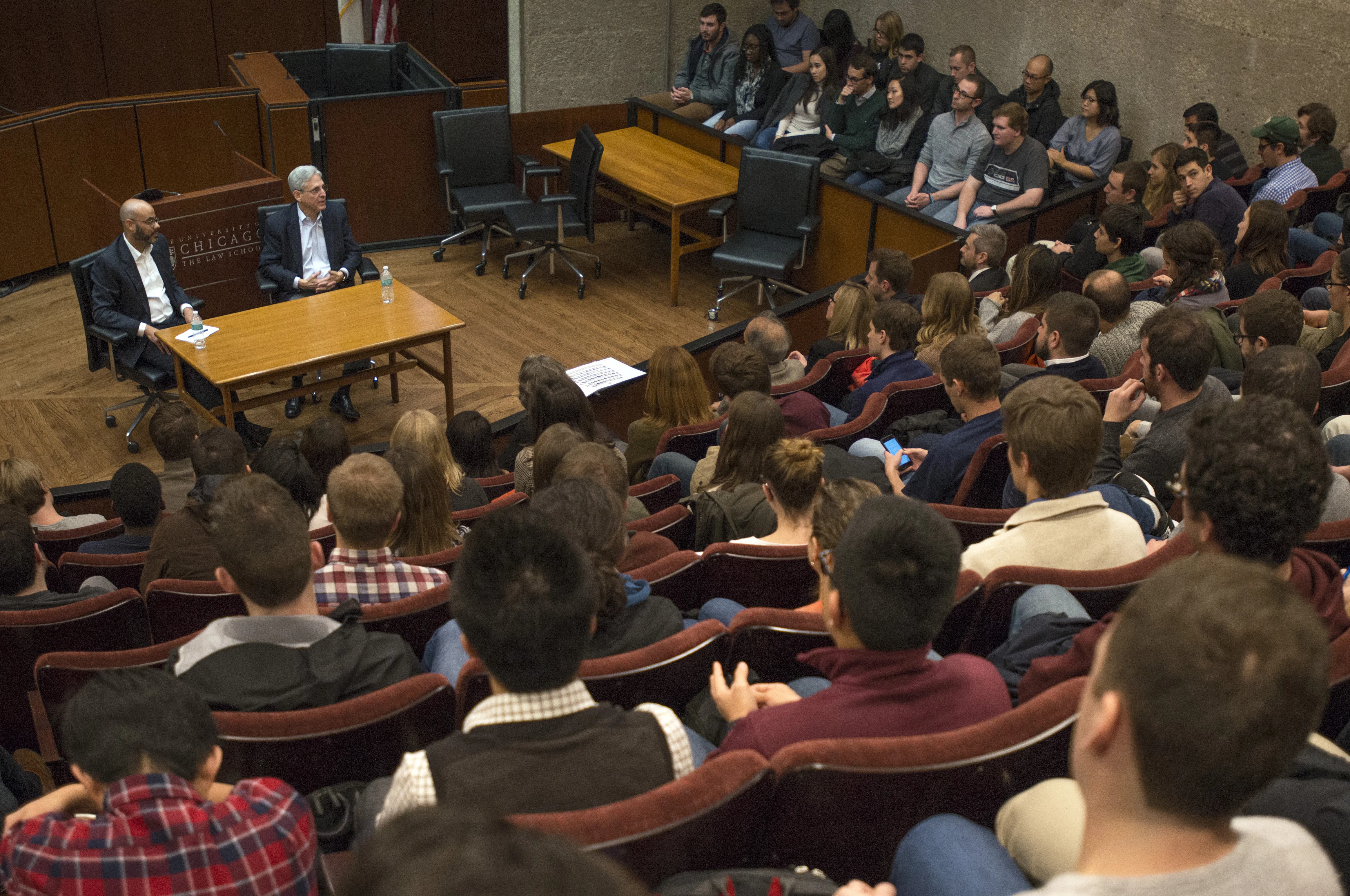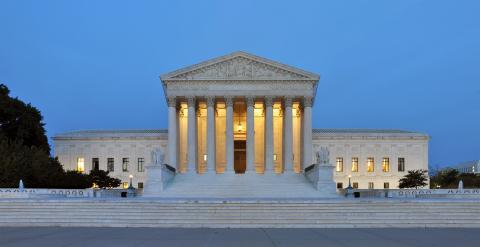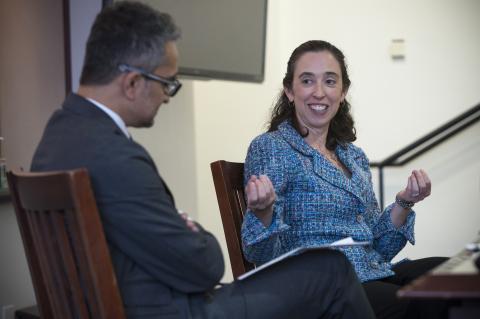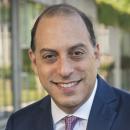Four Alumni to Clerk on SCOTUS Next Term as Overall Clerkship Numbers Continue Record Growth

Four University of Chicago Law School alumni will clerk for US Supreme Court justices during the 2019-20 term, continuing a 47-year streak. At least one Law School graduate has clerked on the High Court for at least part of each term since 1972, but this year’s numbers are notable because they coincide with record growth in overall clerkship employment among Law School graduates.
Kelly Holt, ’17, and Stephen Yelderman, ’10, will clerk for Justice Neil Gorsuch; Mica Moore, ’17, will clerk for Justice Elena Kagan; and Caroline Cook, ’16, will clerk for Justice Clarence Thomas. They will follow Madeline Lansky, ’16, who is clerking for Thomas this term, and Aimee Brown, ’14, who is clerking for Justice Samuel Alito and now-retired Justice Anthony Kennedy. All six alumni clerked on the US Court of Appeals before earning their Supreme Court spots.
“These are four extraordinary lawyers who were each tremendously successful students at the Law School and whose futures couldn’t be brighter,” said Lior Strahilevitz, the Sidley Austin Professor of Law, who co-chairs the faculty clerkship committee with Jonathan Masur, the John P. Wilson Professor of Law. “Supreme Court justices are hardly alone in noting the remarkable quality of our graduates. Throughout the federal and state judiciaries, Chicago students and alumni are in especially high demand.”
It is typical for the Law School to have multiple alumni clerking on the Supreme Court at once: in 37 of the past 47 years, two or more clerks on the Supreme Court have been graduates of the Law School. In 15 of those years, four or more Supreme Clerks have been Chicago alumni—including in 1993, when there were eight, and 1994, when there were seven. There were four at one time as recently as 2017, when Nick Harper, ’15, and Krista Perry, ’16, clerked for Kennedy; Eric Tung, ’10, clerked for Gorsuch; and Gilbert Dickey, ’12, clerked for Thomas.
Law School alumni traditionally have done well securing clerkships on the lower courts, too, but expanded efforts to counsel aspiring clerks have further boosted those numbers in recent years. In 2018, 27 percent of students entered state or federal clerkships immediately after graduation—the highest figure in recent memory, and more than double the 12.9 percent who entered clerkships immediately after graduation in 2013.
“More and more of our students come to law school hoping to clerk,” said Masur, “and they’re right to want to. Clerkships are great jobs, great learning experiences, and great opportunities to find a life-long mentor. They can also jump-start a student’s career. Our goal as a clerkship committee is to tell students about the advantages of clerking and then to help find a clerkship for each and every student who wants one.”
In the past several years, following changes in the previous hiring plan judges used to hire entry-level clerks, the faculty clerkship committee and the Office of Career Services enhanced its system for helping students navigate the application process. Career Services devoted additional staff to clerkship hiring and increased messaging that encouraged all students with clerkship aspirations to take advantage of one-on-one counseling and interview coaching.
“It’s an amplification of what we were already doing really well,” said Lois Casaleggi, senior director in the Office of Career Services.
The faculty clerkship committee expanded several years ago to include Professors Genevieve Lakier, John Rappaport, and Daniel Hemel. Every member of the committee is a former clerk, and they share their deep knowledge of the experience, the judges, and the application process with students, guiding them during law school and, often, for several years after.
Career Services staff and faculty also work to expose students to the judiciary through programs like the Edward H. Levi Distinguished Visiting Jurist lecture series. Since the program began in 2013, more than two dozen judges have visited the Law School, delivering lunch talks and often meeting with a small group of students and faculty. Recent visiting jurists have included Merrick Garland, chief judge of the DC Circuit; Michelle Friedland of the Ninth Circuit, Timothy Tymkovich, chief judge of the Tenth Circuit; Cheryl Krause of the Third Circuit; Jeffrey S. Sutton of the Sixth Circuit; John Z. Lee of the US District Court for the Northern District of Illinois, and Beryl Howell, chief judge of the US District Court for the District of Columbia.
“A major goal of the Levi program is to help our students, especially 1Ls and 2Ls, get comfortable with judges and realize that they are people too, albeit very accomplished ones,” said Strahilevitz, who coordinates the program. “When their schedules permit, we always have the judges meet with anywhere between a dozen and two dozen students over breakfast. One of the hardest parts of my job is walking into those breakfasts to let everyone know it’s time to take the judge to his or her next event. The judges and the students alike look really disappointed when I enter the room! And I’ve gotten used to having the judges tell me how lucky we are to get to teach Chicago students every day, a sentiment I share.”
Clerkships on lower courts are an important step for students seeking to clerk on the Supreme Court. Holt, who currently works at Jones Day, clerked for Judge J. Harvie Wilkinson III on the Fourth Circuit after graduation. Yelderman, currently a law professor at Notre Dame, clerked for Gorsuch on the Tenth Circuit in 2010. Moore, who is clerking for Vince Chhabria on the US District Court for the Northern District of California, previously clerked for Judge William Fletcher on the Ninth Circuit in 2017. And Cook, who is clerking for Judge Gregory Katsas on the DC Circuit, clerked for Judge Diane Sykes on the Seventh Circuit in 2016.
But the clerkship experience also is valuable for students entering careers in big law firms and other areas of the profession.
“So much of law school is about learning how judges decide cases,” said Masur. “What better way to gain that knowledge than to work closely with a judge? Whether a student’s destination is public interest or a large law firm, transactional practice or litigation, I can hardly think of a more valuable way to spend a year after graduation.”


